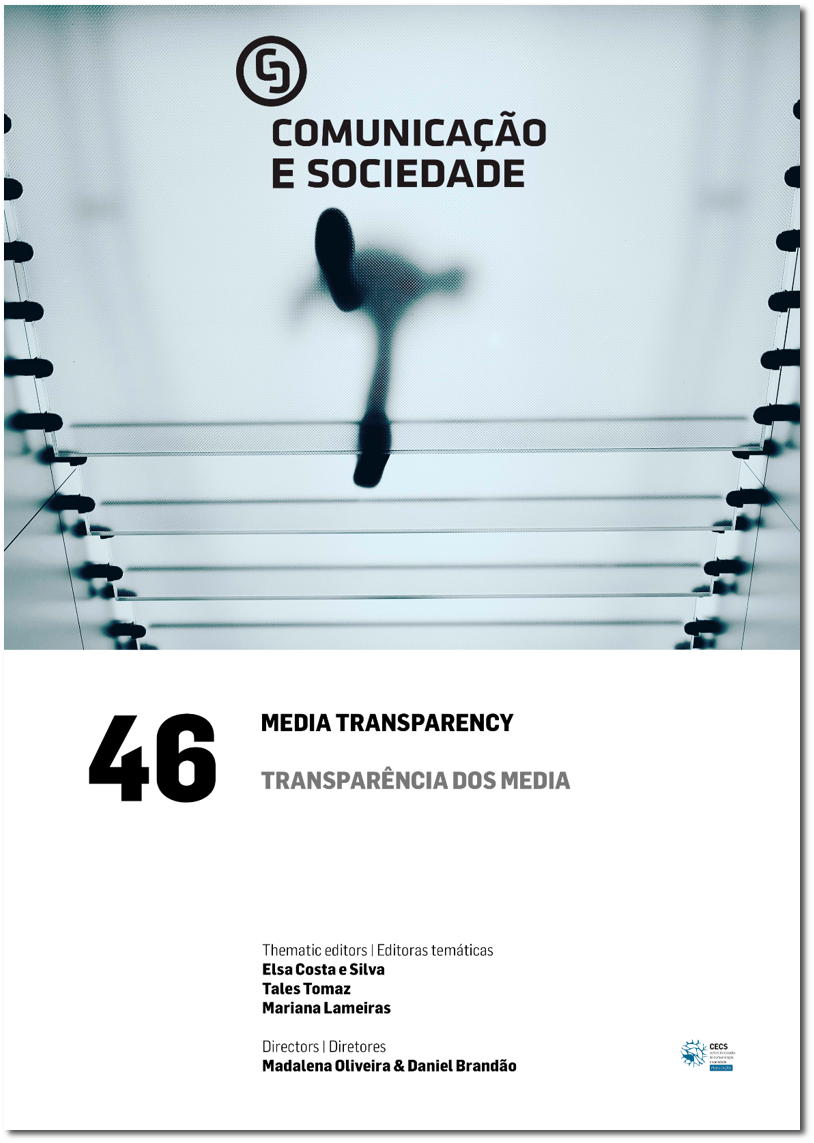Promoting Transparency as a Strategy for Affirmation in the News Market: An Analysis of Entrepreneurial Journalism Projects
DOI:
https://doi.org/10.17231/comsoc.46(2024).5703Keywords:
journalism, transparency, funding, independence, PortugalAbstract
Promoting transparency is seen as one of the key mechanisms for generating trust in the work of journalists and thereby strengthening democracies. The principle is that making information about media ownership, funding, and editorial decision-making criteria public enhances understanding of the less visible aspects of journalistic production, thus increasing credibility by identifying potential conflicts of interest. In recent years, technological development, particularly the internet’s growing capabilities, coupled with the crisis in journalism’s business models, which is jeopardising traditional funding models, has led to the emergence of entrepreneurial journalistic projects that claim to be alternative and independent. These projects seek to distinguish themselves from mainstream journalism through their structure, funding and ownership models, and they find a strategy for promoting transparency that sets them apart from traditional media. This article aims to identify and analyse the transparency promotion practices of these journalistic projects, relating them to a strategy of affirmation in the news market.
Downloads
References
Atton, C. (2003). What is “alternative” journalism? Journalism, 4(3), 267–272. https://doi.org/10.1177/14648849030043001
Baptista, C. (2022). Transparency in Portuguese media: From the buzzword to the unsolved regulatory challenge. Observatório (OBS*), 16(2), 138–149.
Bonixe, L. (2022). Práticas e modelos do jornalismo empreendedor em Portugal. Brazilian Journalism Research, 18(3), 550–573. https://doi.org/10.25200/BJR.v18n3.2022.1494
Brouwers, A. D. (2017). Failure and understanding-with in entrepreneurial journalism. Journal of Media Business Studies, 14(3), 217–233. https://doi.org/10.1080/16522354.2018.1445161
Bruno, N., & Nielsen, R. K. (2012). Survival is success: Journalistic online start-ups in Western Europe. Reuters Institute for the Study of Journalism.
Cádima, R. (Ed.). (2019). Diversidade e pluralismo nos média. ICNOVA.
Carbasse, R., Standaert, O., & Cook, C. E. (2022). Entrepreneurial journalism: Emerging models and lived experiences. Looking back and looking forward. Brazilian Journalism Research, 18(2), 246–265. https://doi.org/10.25200/BJR.v18n2.2022.1542
Cohen, N. (2015). Entrepreneurial journalism and the precarious state of media work. The South Atlantic Quarterly, 114(3), 513–533. https://doi.org/10.1215/00382876-3130723
Comissão Europeia. (2022, 16 de setembro). Ato legislativo europeu sobre a liberdade dos meios de comunicação social: Comissão propõe regras para proteger o pluralismo e a independência dos meios de comunicação social na EU. https://ec.europa.eu/commission/presscorner/api/files/document/print/pt/ip_22_5504/IP_22_5504_PT.pdf
Curry, A. L., & Stroud, N. J. (2021). The effects of journalistic transparency on credibility assessments and engagement intentions. Journalism, 22(4), 901–918. https://doi.org/10.1177/1464884919850387
Entidade Reguladora para a Comunicação Social. (2021). Relatório de regulação 2020. https://portaltransparencia.erc.pt/media/1074/erc-relat%C3%B3rio-de-regula%C3%A7%C3%A3o-2020.pdf
Figueira, A., & Costa e Silva, E. (2023). A transparência como dimensão da qualidade: A propriedade dos média e os desafios da (in)visibilidade. Comunicação e Sociedade, 44, e023021. https://doi.org/10.17231/comsoc.44(2023).4708
Forde, S. (2009). What’s so alternative about alternative journalism? Griffith University. http://hdl.handle.net/10072/31899
Geels, K., Ciobanu, M., Warner, J., Iastrebner, M., Breimer, S., Vujanic, L., Ledda, E., Chang, N., Breiner, J., & LaFontaine, D. (2023). A research project on the trends, impact and sustainability of independent digital native media in more than 40 countries in Europe. Project Oasis. https://projectoasiseurope.com/wp-content/uploads/2023/04/Project-Oasis-PDF-April-17-2023.pdf
Karlsson, M. (2020). Dispersing the opacity of transparency in journalism on the appeal of different forms of transparency to the general public. Journalism Studies, 21(13), 1795–1814. https://doi.org/10.1080/1461670X.2020.1790028
Kauhanen, E., & Noppari, E. (2007). Innovation, journalism and future. Final report of the research project Innovation Journalism in Finland. TEKES Technology Review.
Kovach, B., & Rosenstiel, T. (2001). Os elementos do jornalismo. Porto Editora.
Lewis, C. (2010, 29 de outubro). New journalism ecosystem thrives. Investigative Reporting Workshop.
Lei n.º 78/2015, de 29 de julho, Diário da República n.º 146/2015, Série I de 2015-07-29. (2015). https://diariodarepublica.pt/dr/detalhe/lei/78-2015-69889523
Meier, K. (2009, 9–10 de setembro). Transparency in journalism: Credibility and trustworthiness in the digital future [Apresentação de comunicação]. Conferência “The Future of Journalism”, Cardiff, País de Gales.
Meier, W., & Trappel, J. (2022). Media transparency: Comparing how leading news media balance the need for transparency with professional ethics. In J. Trappel & T. Tomaz (Eds.), Success and failure in news media performance: Comparative analysis in the Media for Democracy Monitor 2021 (pp. 255–273). Nordicom. https://doi.org/10.48335/9789188855589-12
Miranda, J., & Camponez, C. (2022). Accountability and transparency of journalism at the organizational level: News media editorial statutes in Portugal. Journalism Practice, 18(4), 897–917. https://doi.org/10.1080/17512786.2022.2055622
Moran, R. E. (2021). Subscribing to transparency: Trust-building within virtual newsrooms on slack. Journalism Practice, 15(10), 1580–1596. https://doi.org/10.1080/17512786.2020.1778507
Pereira, C. (2024, 3 de janeiro). Uma equação com resultado negativo. Divergente.
Porlezza, C., & Splendore, S. (2016). Accountability and transparency of entrepreneurial journalism: Unresolved ethical issues in crowdfunded journalism projects. Journalism Practice, 10(2), 196–216. https://doi.org/10.1080/17512786.2015.1124731
Queiroz, F. (2022, 6 de fevereiro). O que é o jornalismo de soluções? Coimbra Coolectiva. https://coimbracoolectiva.pt/historias/temas/comunidade/o-que-e-jornalismo-de-solucoes/?doing_wp_cron=1710258223.5542199611663818359375
Regulamento n.º 835/2020, 2 de outubro de 2020, Diário da República n.º 193/2020, Série II de 2020-10-02. (2020). https://diariodarepublica.pt/dr/detalhe/regulamento/835-2020-144456439
Sandoval, M., & Fuchs, C. (2010). Towards a critical theory of alternative media. Telematics and Informatics, 27(2), 141–150. https://doi.org/10.1016/j.tele.2009.06.011
Silveira, S. C., & Ramos, A. (2022). Sustentabilidade de arranjos jornalísticos empreendedores no Brasil: Um estudo de sete nativos digitais. Brazilian Journalism Research, 18(2), 290–315. https://doi.org/10.25200/BJR.v18n2.2022.1496
Silverman, C. (2014). The best ways for publishers to build credibility through transparency. American Press Institute. https://americanpressinstitute.org/transparency-credibility/
Teixeira, L. M., & Jorge, A. (2021). Plataformas de financiamento coletivo na economia política dos média alternativos. Comunicação e Sociedade, 39, 183–202. https://doi.org/10.17231/comsoc.39(2021).2863
Vos, T. P., & Singer, J. B. (2016). Media discourse about entrepreneurial journalism. Journalism Practice, 10(2), 143–159. https://doi.org/10.1080/17512786.2015.1124730
Downloads
Published
How to Cite
Issue
Section
License
Copyright (c) 2024 Luís Bonixe

This work is licensed under a Creative Commons Attribution 4.0 International License.
Authors own the copyright, providing the journal with the right of first publication. The work is licensed under a Creative Commons Attribution 4.0 International License.












